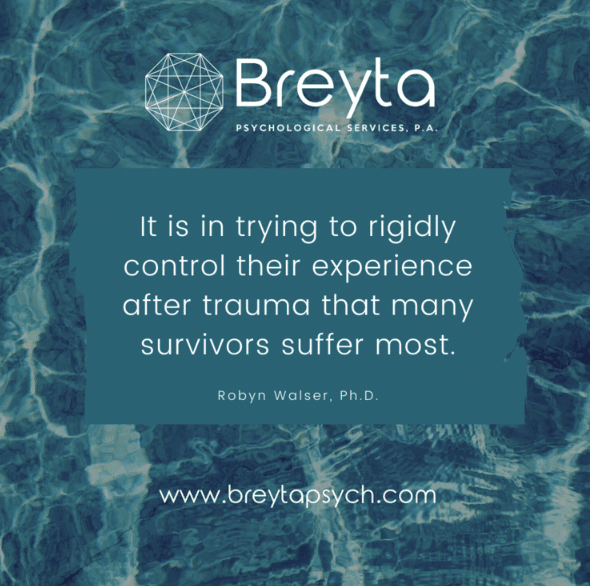Trauma and Control

If you’ve experienced a traumatic event, you likely felt blindsided and overwhelmed by the fact that it happened at all; let alone by the fallout and consequences that followed. Trauma is traumatic for us because it’s something very threatening that we weren’t prepared for and could not control at the time.
Often as a result of this experience, we overcorrect and struggle to maintain a healthy perspective on our ability to “control” our life. This applies to our internal experience, such as thoughts, feelings, and sensations, as well as our external experience of behaviors and relationships.
Our minds work extremely hard to “make sense” of a trauma after it happens. It’s difficult to consider the reality that sometimes things just happen. Our minds try to create a sense of comfort and protection by creating an “illusion of control”. It’s common to fall into the fallacy of thinking that if you can control your experience then “nothing bad will happen again”. This isn’t realistic or fair to you, but tell that you your mind.
The Control Agenda
Attempts to control usually show up as rigidity and avoidance. It’s common to find that you stop interacting with people or places that may trigger uncomfortable emotions. You may also avoid relationships or hold people at arm’s length so that you feel you are protecting yourself.
The ways we can attempt to control our experience is vast and differs for each individual. While it’s human nature to try to escape what we deem uncomfortable, when we engage in avoidance to a significant degree, these behaviors can cause more problems than they solve.
Inevitably, attempts to go around, rather than through, a difficult experience will end up keeping you “stuck”. The saying “if you’re not willing to have it, you’ve got it – times ten” holds true.
Avoidance Keeps You “Stuck”
So what can you do if you find yourself “stuck” in this way? The path forward is through and that is achieved by processing what you went through, examining your relationship to your thoughts and feelings, and learning to relate to that experience in a more functional way. This is absolutely possible with evidence-based psychotherapy for trauma and PTSD.
You deserve to heal and recovery is possible. With the help of your psychologist, you can learn to move toward acceptance of your emotions and change your relationship to difficult experience.





